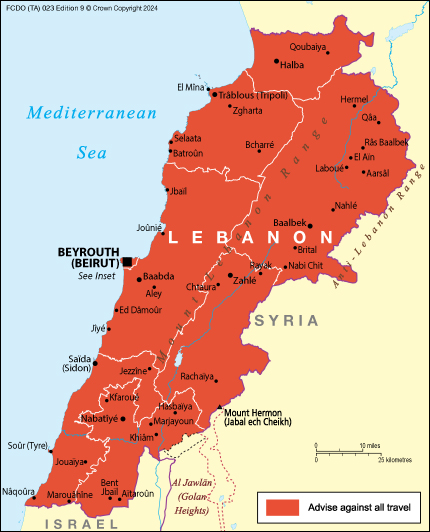Lebanon
Warnings and insurance

Your travel insurance could be invalidated if you travel against advice from the Foreign, Commonwealth & Development Office (FCDO). Consular support is also severely limited where FCDO advises against travel.
Areas where FCDO advises against travel
FCDO continues to advise against all travel to Lebanon. If you are currently in Lebanon, we encourage you to leave, while commercial options remain available.
For further information on why we advise against travel, see Conflict affecting Lebanon and Regional risks.
See safety and security and regional risks for information on known security risks in Lebanon and advice on how to keep yourself safe. You should sign up to get email notifications when this travel advice is updated.
Register your presence
If you are a British national in Lebanon, Register Your Presence to tell the UK government that you are there. If you previously registered your details with us (before 12 September), you will need to register again.
Registering your presence includes providing your up-to-date contact information. You should complete a separate form for each member of your family or group who is a British national.
Your registration will allow us to share any updates.
Conflict affecting Lebanon
FCDO advises against all travel to Lebanon due to risks associated with the ongoing conflict between Israel, Lebanese Hizballah and other non-state actors in Lebanon.Lebanon and advises anyone in Lebanon to leave now.
There are ongoing mortar and artillery exchanges and airstrikes in Lebanon, primarily on the boundary with Israel but also in other parts of the country, including Beqaa Valley and locations north of the Litani river. Southern Beirut has been repeatedly targeted by airstrikes, including an attack on 20 September which injured hundreds. The Washington Institute’ provides an online map which may be helpful to understand recently affected areas. British nationals should exercise caution and monitor local media for developments.
On 28 September, Lebanese Hizballah leader Hassan Nasrallah was confirmed dead following an Israeli air strike in southern Beirut. There are reports of celebratory gunfire in Lebanon in response to the announcement and protests cannot be ruled out. The situation could escalate quickly and pose risks for the wider region. Exercise caution, avoid demonstrations, and monitor local media for developments.
Following the start of the conflict in Israel and the Occupied Palestinian Territories, large protests took place in major cities and near the British and other Western embassies. Further protests cannot be ruled out. Exercise caution and avoid demonstrations.
Tensions are high and events could escalate with little warning, which could affect or limit exit routes out of Lebanon. In the event of deterioration in the political or security situation, commercial routes out of Lebanon could be severely disrupted or cancelled at short notice, and roads across the country could be closed. In line with the FCDO’s existing advice against all travel to Syria and to the Northern Border region of Israel, the FCDO advises against leaving Lebanon through land border crossings. The British embassy may be increasingly limited in the assistance that it can provide. If you are currently in Lebanon, you should leave now.
Check with airlines and travel companies for updates on flight availability. We encourage you to book the next available flight, even if it is not a direct route. When planning your travel to the airport, monitor the local security situation and only make the journey if you judge it safe to do so. Ensure your travel documents and those of your family’sfamily are current. If the situation deteriorates, it might not be possible to issue a passport in time for any journey you might plan.
Do not rely on FCDO being able to evacuate you in an emergency.
British Nationals should keep up to date with local and international media including TV and radio stations such as Virgin Radio Lebanon (FM 89.5) and Voice of Lebanon / Sawt Lubnan (FM 100.3 - 100.5) which may be useful sources of information on any developments.
You should have a personal emergency plan that does not rely on the UK government. This may include the ability to leave quickly or to shelter in place if you judge it necessary and safe to do so.
Read FCDO advice on what to do if you’re affected by a crisis abroad and how to prepare.
Explosion of communication devices
On 17 September, a number of pagers, allegedly held by members of Lebanese Hizballah, exploded simultaneously in locations across Lebanon. Lebanon’s Health Ministry have reported thousands of injuries and several killed. Hospitals may be very busy as a result, and you should expect an increased presence of Lebanese Armed Forces in affected areas. British Nationals should exercise caution and monitor local and international media, which may be a useful source of information on developments.
Help and support in Lebanon
You can contact the emergency services by calling 112.
If you need urgent help (for example, you’ve been attacked, arrested or someone has died), call +961 (0)1 960 800.
If you’re in Lebanon and you need advice which is not covered by reading our travel advice, you can contact FCDO online.
While 24-hour consular assistance is available by phone or online, in-person consular support is severely limited outside of Beirut.
Travel insurance
If you choose to travel, research your destinations and get appropriate travel insurance. Insurance should cover your itinerary, planned activities and expenses in an emergency.
About FCDO travel advice
FCDO provides advice about risks of travel to help you make informed decisions. Find out more about FCDO travel advice.
Follow and contact FCDO travel on Twitter, Facebook and Instagram. You can also get email notifications when this travel advice is updated.